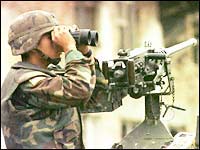 The US and NATO's role in Bosnia and Herzegovina
The US and NATO's role in Bosnia and HerzegovinaSOURCE: NATO Fact sheets
NATO leads a 20,000-strong peacekeeping mission, or Stabilisation Force (SFOR), to Bosnia and Herzegovina (Bosnia) that maintains the security environment necessary to enable the country to rebuild after the devastation of years of conflict.

|
| Logo of Nato force, Bosnia -AP- |
Preserving a secure environment remains SFOR's core mission, but as conditions within Bosnia have improved, SFOR has been able to assist civilian implementation of the peace agreement. The latest meeting in May 2000 of the Peace Implementation Council - the body of countries and international organisations overseeing the Bosnian peace process - identified three strategic areas to take the peace process forward, namely deepening economic reform, accelerating refugee returns, and fostering functional and democratically accountable common institutions.
Today, SFOR figures actively in efforts to help refugees and displaced persons return to their homes and is working on ways of reforming the Bosnian military - currently divided into three ethnically based, rival armies (Bosnian Muslim, Croat and Serb) - in such a way as to avert any prospect of renewed conflict. On a visit to Bosnia in summer 2000, NATO Secretary General Lord Robertson made clear that the country's militaries had to be brought under a single command if the country wished to be considered for NATO's Partnership for Peace programme.

|
| US soldier looks through binoculars near Tuzla, Bosnia. -AP- |
This Committee coordinates the activities of the local armed forces and the ministries of defence of Bosnia's two entities, the Federation of Bosnia and Herzegovina and Republika Srpska. In addition, it supports a variety of multi-ethnic working groups charged with developing policy options on defence issues. NATO sponsors a Security Cooperation Programme with Bosnia that, in partnership with the other international organisations, assists the Bosnian defence community bring in key reforms.
The programme includes the development of a defence policy for Bosnia, the development of a state-level defence establishment, and the restructuring of the entities' armed forces. These efforts are designed to help Bosnia build a unified command and control structure, and, in the longer term, to encourage the development of joint doctrine, and standards for training and equipping that are compatible with NATO and Partnership for Peace norms.
Under the terms of the peace agreement, the local Bosnian authorities are supposed to hand over individuals indicted for war crimes to the International Criminal Tribunal for the former Yugoslavia in The Hague. Since they have largely failed to do this, NATO has itself been active in bringing such individuals to justice. As of August 2000, of the 37 indictees in custody, NATO troops have arrested 21 and transferred them to The Hague. Two others were killed by SFOR soldiers in self-defence during operations to apprehend them and NATO has assisted in the transfer of a further 9 indictees to The Hague.
Mission history
SFOR has a UN mandate not just to maintain peace in Bosnia, but also, where necessary, to enforce it. As the security situation has improved, the number of troops there has been reduced. The current level of about 20,000 is significantly lower than the 32,000 deployed between December 1996 and November 1999, and only a third of the 60,000 deployed in the earlier Implementation Force (IFOR).
IFOR had a one-year mandate to oversee implementation of the military aspects of the peace agreement - bringing about and maintaining an end to hostilities; separating the armed forces of Bosnia's two newly created entities, the Federation of Bosnia and Herzegovina and Republika Srpska; transferring territory between the two entities according to the peace agreement; and moving the parties' forces and heavy weapons into approved storage sites. These goals were achieved by June 1996.
As SFOR succeeded IFOR at the end of 1996, the mission's aims became more ambitious. In addition to deterring a resumption of hostilities and promoting a climate in which the peace process could continue to move forward, they included providing an increased level of selective support, within SFOR's means and capabilities, to civilian organisations.
Context
IFOR deployed in Bosnia six days after the signing in Paris of the Dayton Peace Accord on 14 December 1995. The peace agreement was reached after three weeks of intense negotiations at the Wright Patterson air base in Dayton, Ohio, in which representatives of the Allies were actively engaged, and followed three-and-a-half years of war.

|
| French IFOR soldier disarms mine near Sarajevo in Bosnia. -AP- |
NATO originally became involved in the Bosnian war in support of the United Nations. Together with the Western European Union, the Alliance monitored and enforced UN sanctions in the Adriatic. The Alliance also monitored and enforced the UN no-fly zone over Bosnia; provided close air support to the UN Protection Force (UNPROFOR) on the ground; and carried out air strikes to lift the siege of Sarajevo.